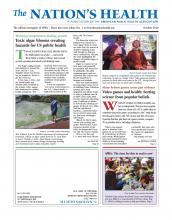Racism in medical schools can influence whether graduating doctors choose to practice in high-need communities, a new study finds.
Published in August in Academic Medicine, the study is based on data from more than 3,700 students at 49 U.S. medical schools collected between 2010 and 2014. It is part of the Medical Student Cognitive Health and Growth Evaluation Study, the first longitudinal survey of the effects of medical education on student biases and attitudes.
While the survey gathers data related to many population groups, researchers narrowed their scope to attitudes toward black Americans.
They found that explicit racial attitudes and “medical authoritarianism” were associated with losing or having no interest in caring for underserved or minority people. On medical authoritarianism, researchers said the findings could suggest that “experiences within the context of medical education may reinforce a belief in the importance of social hierarchy and dissuade students from seeking a career focused on caring for those they perceive to be lower in that hierarchy.”
Overall, researchers found little change in the percentage of beginning and graduating medical students who intended to work in underserved and minority areas, which is not encouraging news for efforts to close health disparities and advance equity, said study co-author Liselotte Dyrbye, MD, MHPE, a professor of medicine at Mayo Clinic in Rochester, Minnesota.
“We need that number to go up,” Dyrbye told The Nation’s Health. “We need to recognize that although we graduate a lot of physicians every year, how the workforce is ultimately distributed across the U.S. is one that leaves many groups of patients really struggling to access care.”
The study also identified factors associated with gaining interest in working in underserved and minority communities. Researchers found that developing such an interest was associated with taking part in a minority health seminar, the medical school’s learning orientation toward interracial interactions, as well as the number of interactions students had with black students, faculty and staff. Service learning and perception by students of their school’s dedication to diversity were also related to gaining an interest in working in high-need areas.
The data also showed that a tenser interracial climate at medical school and more frequent experiences of racism reported by minority students were associated with developing a desire to work in minority communities.
“There are a lot of factors within the control of medical schools to change the curriculum and to really improve the overall aspects of the learning environment so we get more medical students wanting to work in underserved communities,” Dyrbye said. “We have to continue to work on our diversity efforts because it really does matter in so many ways.”
Dyrbye highlighted several components for increasing interest in caring for underserved patients, including raising student awareness of minority health and disparity issues, as well as requiring service learning experiences. She also recommended giving students opportunities to collaborate with diverse groups of people, and strengthening students’ belief that they can have positive relationships with a range of patients by helping them boost their communication and cultural competency skills.
While many medical schools offer courses and experiences related to disparities and minority health, she said that a challenge is finding the best ways to integrate the subjects into an already packed and highly demanding curriculum.
“I do think it’s become a priority to diversity staff and medical schools, that it’s becoming a priority to teach students about diversity-related issues,” Dyrbye said. “Many medical schools are introducing curriculums to do just that. The question will be how much, when and how often.”
“There’s still lots of questions,” she added, “but this research is pointing us in the right direction.”
For more information on the study, visit https://journals.lww.com/academicmedicine.
- Copyright The Nation’s Health, American Public Health Association









